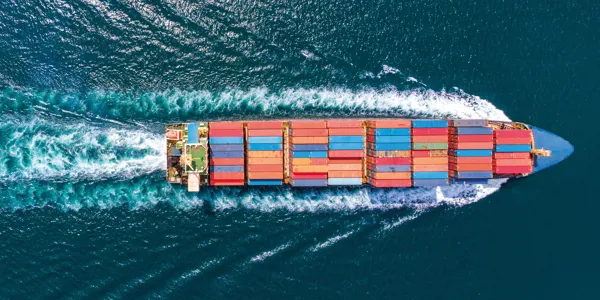How will the Red Sea disruptions impact my investments in 2024?
The Red Sea, historically a vital artery for shipping and commerce, has now become the stage for a geopolitical storm caused by Houthi rebel attacks. The Houthis, who are financed by Iran, said they attacked cargo ships in response to Israel’s bombardment of Gaza.

However, the disruption has roots in long-standing regional rivalries, which have recently been exacerbated by Middle East tensions and the ever-shifting sands of international relations.
The Red Sea attacks have also reignited supply chain concerns, but will this conflict have the same impact on those as the Covid pandemic did?
What’s the impact of the attacks?
The Houthi attacks have affected global maritime trade by adding significant delays to shipping routes along the Suez and come at a time when transport through the Panama Canal, another critical shipping route, has been impacted by climate change. Re-routing to avoid the attacks has resulted in increased transport times by around 15 days as ships go around South Africa’s Cape of Good Hope.
This, in turn, is pushing up the cost of staffing, insurance and raising the cost of global shipping overall. They are also causing some disruption to supply chains. It’s resulted, for example, in several European car makers announcing production shutdowns as they struggle to obtain car parts from Asia in time.
The fighting has resulted in the closure of the Gulf of Aden’s Bab-El-Mandeb Strait, but this has only caused a delay and not a stoppage in energy shipment. This is because supplies can bypass the Strait through alternative routes.
It is also predicted that Russian crude oil will not be affected as, in theory, Moscow could ask Tehran to instruct Houthi allies to give Russian tankers permission to pass through the Red Sea unharmed.
Will we see pandemic style supply chain disruption?
While these disruptions may be reminiscent of the supply chain issues that occurred after the pandemic, there are now several key differences that will result in the overall impact being minimal compared to what the world went through in 2021-2022. These include:
- China’s excess capacity and low demand. During the pandemic the world struggled as China was still undergoing severe lockdown restrictions meaning goods were not manufactured or exported. But since China’s reopening the supply-demand balance has been mostly restored and this, along with sluggish demand for goods, is helping to keep manufactured goods prices down.
- An excess in container ships. Many container ships were ordered and built during the pandemic period and continue to enter service. It means there’s a greater potential for shipping rates to revert to normal once conflict in the Red Sea ends.
- An end to lockdown restrictions. Manufacturing stalled during Covid due to harsh lockdown restrictions compounded by strong demand due to household savings being supported by government handouts, both of which are no longer in force.
It’s unclear how long the disruption will persist as there’s no end in sight in the Red Sea and Middle East conflict. For now, the impact on the supply of goods, oil and gas has been minimal thanks in part to alternative routes available and subdued demand for goods.
This could change if there’s an escalation in the conflict which leads to a closure of the Strait of Hormuz, as this would cause significant disruption in global oil production and transportation. This scenario is unlikely at present, but it’s something investors will want to keep an eye on.
While the supply chain disruption is not big enough to cause an inflationary shock like the one the world experienced following Covid, the conflict in the region serves as a reminder that we live in a very interconnected world. It shows that regional conflicts, however far away geographically, can still impact on the supply of goods, services and the global investment ecosystem.
Important information
By necessity, this briefing can only provide a short overview and it is essential to seek professional advice before applying the contents of this article. This briefing does not constitute advice nor a recommendation relating to the acquisition or disposal of investments. Details correct at time of writing.




